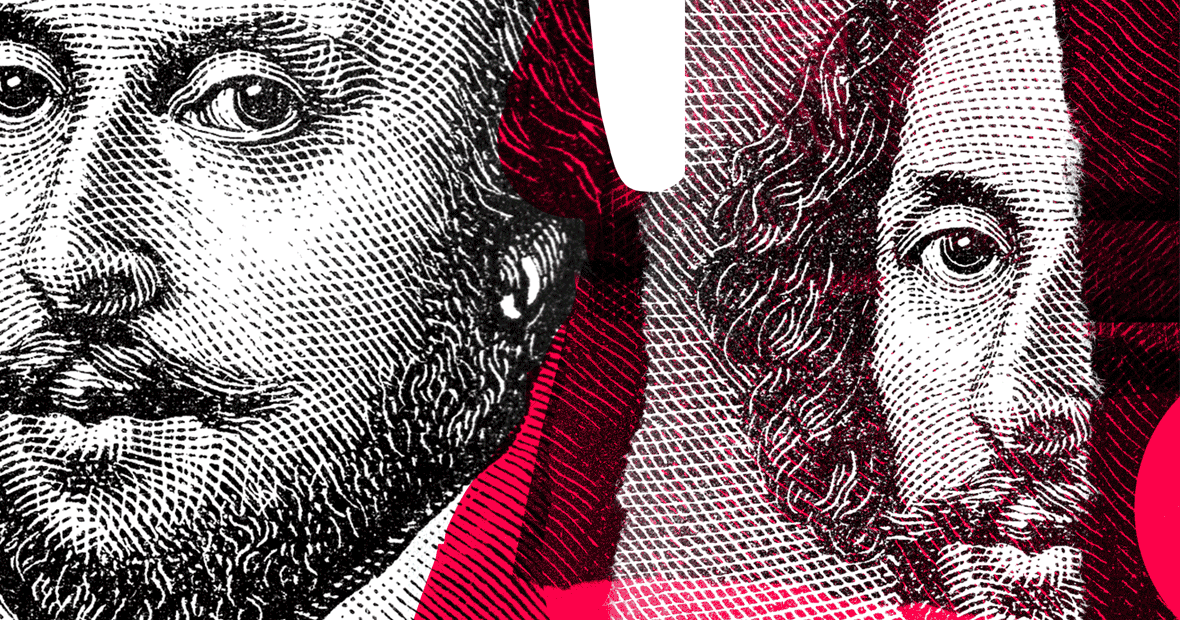 Slate Academy
Slate Academy
Lend Me Your Ears

With Isaac Butler
Readers and audiences have turned to Shakespeare's greatest plays for their insights into power and performance, sex and religion, demagoguery and populism.
But what political currents were likely influencing Shakespeare while he was writing his plays? What can we learn about our present political moment from reading his works now? How have theater makers wrestled with staging the politics of Shakespeare’s plays?
Those are the questions we’re investigating in Lend Me Your Ears, a six-episode podcast miniseries hosted by Isaac Butler. Each month, we’ll dig into a different Shakespeare play and talk with critics, historians, scholars, and theater makers about Shakespeare’s England and the problems it faced. Together, we’ll see how he was responding to his current events, and the ways they map onto our own.
Slate Plus members support our work—and they get a bonus episode every month, featuring a roundtable discussion that further dissects the contemporary context and interpretations of the plays.
Read Isaac Butler's introduction to the series.
Follow along and discuss your thoughts in a members-only Facebook group.
Subscribe in Apple Podcasts or another podcast player.
Or Join Slate PlusSlate Plus members get bonus episodes every week. Already a member? Sign in.
Episodes
Episode 1: Julius Caesar
In the 1590s, worried about future of his own country, Shakespeare turned to the story of the fall of the Roman Republic to examine themes of violence, politics, and mob rule. At a moment of crisis for our republic, what can we learn from Shakespeare’s portrait of the death of Julius Caesar?
Full Episode // Playing Now
Episode 1+: For Slate Plus members only
How do we relate to Julius Caesar’s themes of elitism, performance, and the power of persuasion now? A roundtable discussion featuring The Handmaid’s Tale screenwriter Dororthy Fortenberry and Vanity Fair film critic K. Austin Collins.
Episode 2: Richard II
Richard II is God’s anointed representative on Earth, but by the end of the play that bears his name, he’s dead and his cousin sits on his throne. This is the story of how Shakespeare used English history to ask still-relevant questions about legitimacy, and about how a performance of Richard II played a role in the last Aristocratic rebellion against the English crown.
Full Episode // Playing Now
Episode 2+: For Slate Plus members only
Only for Slate Plus members, Isaac talks to Slate books and culture columnist Laura Miller and Washington Post assignment editor Jacob Brogan about the beautiful poetry of the play, its views on monarchy, and the complex and contradictory ways that legitimacy can operate in politics.
Episode 3: King Lear
If a nation can be thought of as a family, what happens when the family running the nation falls apart? At the exact moment that King James I wanted to unite England and Scotland, Shakespeare answered this question with his masterpiece of tyranny, madness and betrayal.
Full Episode // Playing Now
Episode 3+: For Slate Plus members only
This episode, Isaac is joined by Barry Lam, a Vassar philosophy professor and host of Hi-Phi Nation, and Slate Plus editorial director Gabriel Roth. Together, they discuss reading King Lear in a contemporary context, sympathizing with Lear’s daughters, Lear’s great moment of madness, the character of the Fool, and the play’s concepts of nature and unnaturalness.
Episode 4: Measure for Measure
Five hundred years before #MeToo, Shakespeare wrote his darkest comedy, a story of religion, sexual coercion, and the nature of justice.
Full Episode // Playing Now
Episode 4+: For Slate Plus members only
Isaac is joined by Slate’s editor-in-chief, Julia Turner, and Trumpcast co-host Virginia Heffernan. Together, they discuss Isabella’s conundrum, morality, feminism, and reading the play after the #MeToo movement.
Episode 5: Othello
Othello isn’t just a play about race, toxic masculinity, and the nature of identity, it’s a play that has influenced our own views on race throughout the centuries. But what did race mean in early 17th century London?
Full Episode //
Episode 5+: For Slate Plus members only
Isaac is joined by New York Times culture editor Aisha Harris and Anand Giridharadas, author of Winners Take All, to discuss the play’s themes on race, masculinity, and truthfulness.
Episode 6: Coriolanus
In ancient Rome, the people rise up to demand better treatment, and an ambitious war hero is undone by his contempt for them. Populism, income inequality, and political authenticity collide in this thriller about the very same themes that shaped the 2016 election.
Full Episode // Playing Now
Episode 6+: For Slate Plus members only
Slate Plus members get bonus episodes every week.